Table of Contents
- Introduction to Basenji Dogs
- Physical Characteristics of Basenji Dogs
- Behavioral Traits of Basenji Dogs
- Training Basenji Dogs: Tips and Techniques
- Socializing Basenji Dogs: Challenges and Solutions
- Health Issues in Basenji Dogs: What You Need to Know
- Grooming Basenji Dogs: Keeping Them Looking Their Best
- Basenji Dogs as Family Pets: Pros and Cons
- Activities for Basenji Dogs: Keeping Them Happy and Active
- Conclusion: Is a Basenji Dog Right for You?
Introduction to Basenji Dogs
Basenji dogs, also known as the “barkless dog,” are a unique breed that originated from Central Africa. They are medium-sized dogs with a lean, muscular build and a short, shiny coat that comes in various colors, including black, red, and brindle. Basenjis are known for their distinctive wrinkled forehead, pointed ears, and curly tail.
Origin and History of Basenji Dogs
The Basenji breed can be traced back to ancient Egypt, where they were revered for their hunting skills and considered sacred. They were later brought to Central Africa, where they were used by hunters to track game and help with hunting.
Personality and Temperament of Basenji Dogs
Basenji dogs are intelligent, independent, and curious. They have a strong prey drive and are known for their excellent hunting skills. They are also affectionate and loyal to their families, but they can be wary of strangers. Basenjis have a unique yodel-like sound that they use to communicate, instead of barking, hence the nickname “barkless dog.” They are also known for their high energy levels and need for exercise.
Purpose and Uses of Basenji Dogs
Basenji dogs were originally bred for hunting purposes, but today they make great family pets, watchdogs, and even therapy dogs. They excel in various canine sports, including agility, lure coursing, and obedience trials.
In conclusion, Basenji dogs are a unique breed with a rich history and many positive attributes. They are affectionate, intelligent, and excel in various roles, making them a great addition to any household willing to give them the exercise and attention they need.
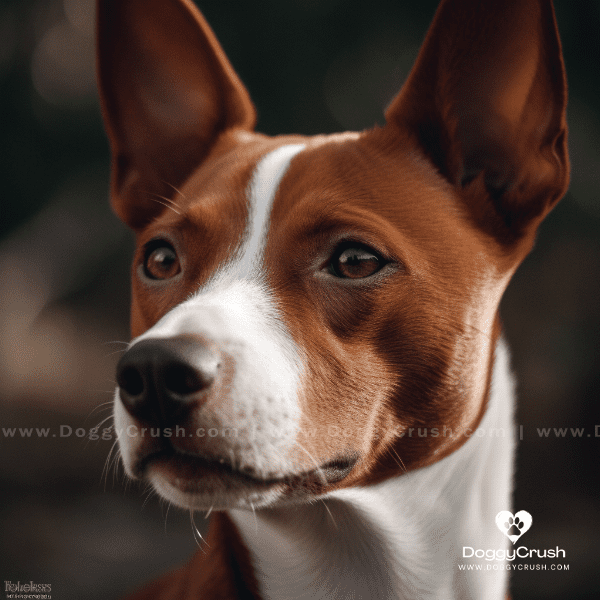
Physical Characteristics of Basenji Dogs
Basenji dogs are a medium-sized breed with a distinctive appearance. Here are some of their physical characteristics:
Size and Proportions
Basenjis are typically 16-17 inches tall at the shoulder and weigh between 22-24 pounds. They have a lean, muscular build with a deep chest, long legs, and a curved tail that curls over their back.
Coat and Colors
Basenjis have a short, sleek coat that comes in various colors, including black, red, brindle, and tricolor. Their coat is easy to maintain, and they only require occasional brushing to keep it shiny and healthy.
Head and Facial Features
Basenjis have a distinctive wrinkled forehead and pointed ears that stand erect. They also have a black nose and almond-shaped eyes that are typically hazel or brown.
Other Physical Features
Basenjis have a unique gait that is often described as a “double-suspension gallop.” They are also known for their athletic abilities, which make them excellent at various canine sports, including agility and lure coursing.
In conclusion, Basenji dogs have a unique physical appearance that sets them apart from other breeds. They have a lean, muscular build and a short, easy-to-maintain coat that comes in various colors. Their distinctive facial features and athletic abilities make them a favorite among many dog enthusiasts.
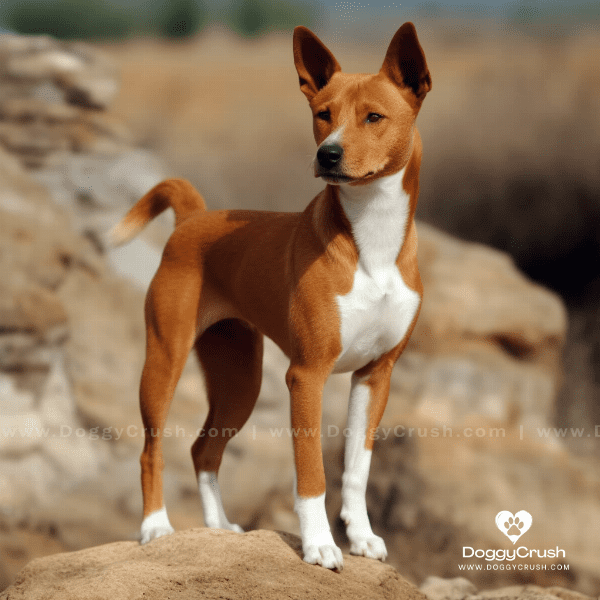
Behavioral Traits of Basenji Dogs
Basenji dogs are known for their unique behavioral traits that set them apart from other breeds. Here are some of their key traits:
Independent and Curious
Basenjis are highly independent dogs with a curious and adventurous nature. They enjoy exploring their surroundings and may have a strong prey drive, which can sometimes lead them to chase after small animals.
Intelligent and Trainable
Despite their independent nature, Basenjis are highly intelligent dogs that can be trained with patience and consistency. They respond well to positive reinforcement techniques and enjoy learning new things.
Vocalization
While Basenjis are often referred to as the “barkless dog,” they are not completely silent. They make a unique yodel-like sound that is a form of communication with their owners and other dogs.
Wary of Strangers
Basenjis can be wary of strangers, which makes them excellent watchdogs. They are loyal to their families but may take some time to warm up to new people.
In conclusion, Basenji dogs have unique behavioral traits that make them an interesting breed to own. They are highly independent and curious, intelligent and trainable, and vocal in their communication. Their high energy levels and need for exercise make them an excellent choice for active families who enjoy spending time outdoors.
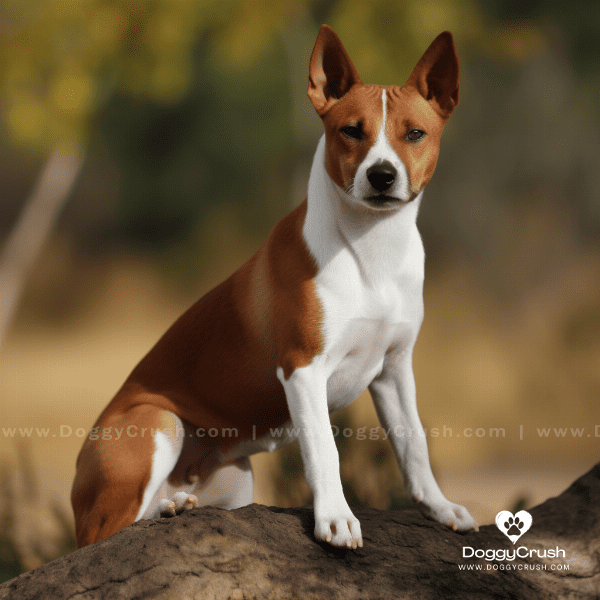
Training Basenji Dogs: Tips and Techniques
Training a Basenji dog can be a rewarding experience, but it requires patience, consistency, and a good understanding of their unique personality and behavior. Here are some tips and techniques for training your Basenji:
Focus on Socialization
Socialization is crucial for Basenjis, as they can be wary of strangers and other animals. Expose your Basenji to different people, animals, and environments from a young age to help them become well-adjusted and friendly.
Use Engaging Activities
Basenjis are highly active dogs that enjoy physical and mental stimulation. Use engaging activities, such as obedience training, agility, and lure coursing, to keep them mentally and physically stimulated.
Keep Training Sessions Short and Fun
Basenjis can have a short attention span, so keep training sessions short and fun. Use positive reinforcement and plenty of praise to keep your dog engaged and motivated.
Be Patient and Consistent
Training a Basenji can be challenging, but with patience and consistency, you can achieve great results. Remember to be patient with your dog, and don’t expect immediate results. It may take time for your Basenji to fully understand and obey commands.
In conclusion, training a Basenji dog requires patience, consistency, and a good understanding of their unique personality and behavior. By starting early, focusing on socialization, using engaging activities, keeping training sessions short and fun, and being patient and consistent, you can train your Basenji to be a well-behaved and happy companion.
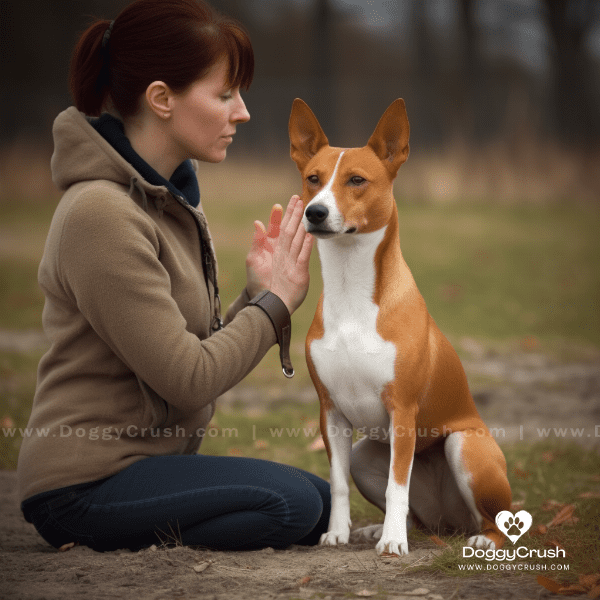
Socializing Basenji Dogs: Challenges and Solutions
Socializing your Basenji is important for their overall development and well-being. However, this can be challenging due to their independent nature and wariness of strangers. Here are some challenges and solutions for socializing your Basenji:
Solution: Start Early and Gradually
Start socializing your Basenji at a young age and gradually expose them to different people and animals. Use positive reinforcement, such as treats and praise, to encourage good behavior and avoid punishment or harsh training methods that can harm the bond between you and your dog.
Challenge: Prey Drive
Basenjis have a strong prey drive, which can make it difficult to socialize them with small animals.
Solution: Leash Training and Controlled Environments
Leash train your Basenji and keep them on a leash when introducing them to small animals. Use controlled environments, such as a fenced yard or a designated dog park, to ensure the safety of your dog and other animals.
Challenge: Dominant Personality
Basenjis have a dominant personality and may try to assert their dominance over other dogs or people.
Solution: Positive Reinforcement and Socialization Classes
Use positive reinforcement techniques to encourage good behavior and avoid punishment or harsh training methods. Consider enrolling your Basenji in socialization classes to help them learn to interact with other dogs and people in a positive way.
In conclusion, socializing a Basenji can be challenging, but with patience and consistency, it is possible to help them become well-adjusted and friendly. By starting early, gradually exposing them to different people and animals, leash training and using controlled environments, using positive reinforcement, and considering socialization classes, you can help your Basenji become a happy and well-behaved companion.
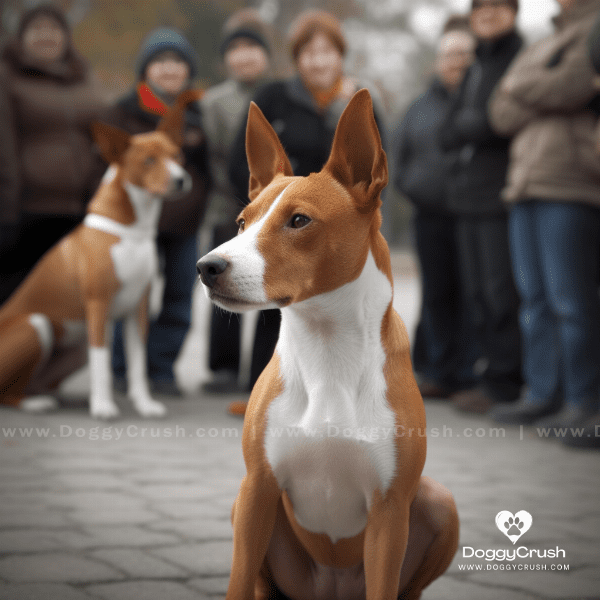
Health Issues in Basenji Dogs: What You Need to Know
Basenji dogs are generally healthy, but like all breeds, they are prone to certain health issues. Here are some health issues you need to be aware of as a Basenji owner:
Fanconi Syndrome
Fanconi Syndrome is a genetic condition that affects the kidneys and can cause damage to the renal tubules, leading to excessive thirst and urination. Symptoms include increased thirst and urine output, lethargy, weight loss, and loss of appetite.
Hip Dysplasia
Hip dysplasia is a common condition in many breeds, including Basenjis. It is a genetic condition that affects the hip joint and can cause pain, lameness, and arthritis.
Progressive Retinal Atrophy (PRA)
PRA is a genetic condition that affects the retina and can lead to blindness. Symptoms include night blindness, dilated pupils, and a loss of peripheral vision.
Hypothyroidism
Hypothyroidism is a condition that occurs when the thyroid gland doesn’t produce enough hormones, which can lead to weight gain, hair loss, and lethargy.
Allergies
Basenjis are prone to allergies, which can be caused by food, pollen, or other environmental factors. Symptoms include itching, redness, and inflammation of the skin.

Grooming Basenji Dogs: Keeping Them Looking Their Best
Basenjis have a short, easy-to-maintain coat that requires minimal grooming. However, there are still some things you can do to keep your Basenji looking their best. Here are some grooming tips for Basenji owners:
Brushing
Basenjis have a short, sleek coat that sheds minimally. Brushing your Basenji once a week with a soft-bristled brush can help remove loose hair and dirt and keep their coat shiny and healthy.
Bathing
Basenjis are clean dogs and only require occasional baths. Use a mild dog shampoo and warm water to bathe your Basenji, and avoid getting water in their ears.
Nail Trimming
Trimming your Basenji’s nails every 4-6 weeks can help prevent overgrowth and discomfort. Use a sharp, pet-specific nail clipper and be careful not to cut the quick (the blood vessel in the nail).
Ear Cleaning
Basenjis have pointed ears that stand erect, which can make them prone to ear infections. Clean your Basenji’s ears once a week with a soft cloth and an ear-cleaning solution recommended by your veterinarian.
Dental Care
Good dental care is important for your Basenji’s overall health. Brush their teeth regularly with a dog-specific toothbrush and toothpaste, and provide dental chews or toys to help keep their teeth clean.
In conclusion, Basenjis have a short, easy-to-maintain coat that requires minimal grooming. However, regular brushing, occasional bathing, nail trimming, ear cleaning, and dental care are still important to keep them looking and feeling their best. By incorporating these grooming habits into your Basenji’s routine, you can help keep them healthy and happy for many years to come.
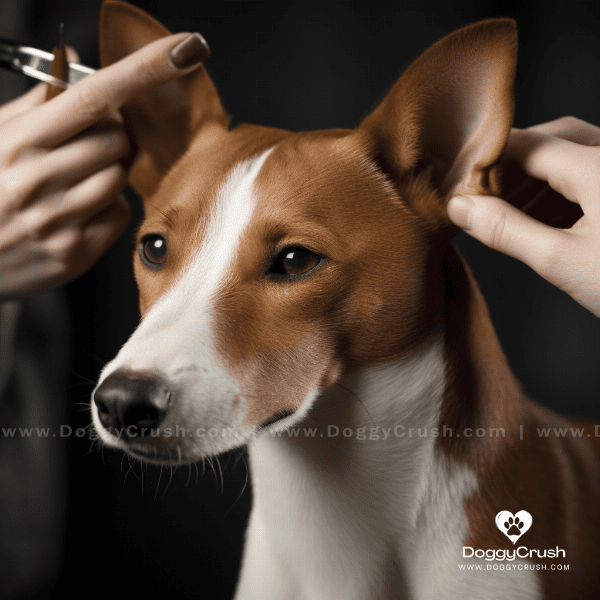
Basenji Dogs as Family Pets: Pros and Cons
Basenjis can make great family pets, but like all breeds, they have their pros and cons. Here are some pros and cons of owning a Basenji as a family pet:
Affectionate and Loyal
Basenjis are affectionate dogs that bond closely with their families. They are loyal and protective of their owners, making them excellent watchdogs.
Intelligent and Trainable
Basenjis are intelligent dogs that can be trained with positive reinforcement techniques. They excel in various canine sports, such as agility and lure coursing, and enjoy learning new things.
Low Shedding and Easy to Groom
Basenjis have a short, sleek coat that sheds minimally and requires minimal grooming. They are a great choice for families who want a low-maintenance dog.
High Energy Levels
Basenjis are a high-energy breed that requires plenty of exercise and mental stimulation. They can become destructive if they don’t receive enough exercise or attention.
Wary of Strangers
Basenjis can be wary of strangers, which can make socializing them a challenge. They may also have a strong prey drive and chase after small animals.
Independent Nature
Basenjis have an independent nature and may not always obey commands. They require a patient and consistent owner who can provide them with the proper training and socialization.
In conclusion, Basenjis can make great family pets, but they have their pros and cons. They are affectionate, intelligent, and easy to groom, but they are also high-energy, wary of strangers, and independent in nature. If you are considering adding a Basenji to your family, it is important to weigh the pros and cons and ensure that you can provide them with the exercise, training, and attention they need to thrive.
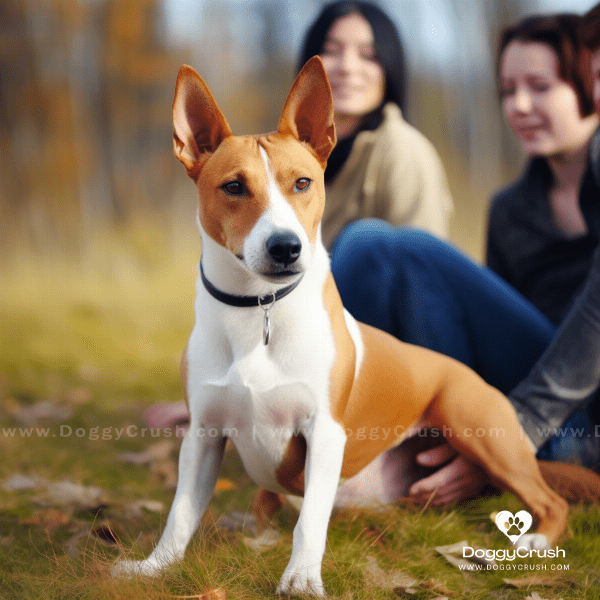
Activities for Basenji Dogs: Keeping Them Happy and Active
Basenjis are a high-energy breed that requires plenty of exercise and mental stimulation to stay happy and healthy. Here are some activities that you can do with your Basenji to keep them happy and active:
Obedience Training
Basenjis are highly intelligent dogs that enjoy learning new things. Enrolling your Basenji in obedience training classes can provide mental stimulation and help them learn to obey commands.
Agility
Agility is a popular canine sport that involves navigating an obstacle course. Basenjis excel in agility due to their high energy levels and athletic abilities.
Lure Coursing
Lure coursing is a sport that involves chasing a mechanical lure around a course. Basenjis have a strong prey drive and excel in lure coursing.
Walking and Hiking
Basenjis enjoy walking and hiking with their owners and require plenty of exercise to stay healthy. Take your Basenji on daily walks or hikes to provide them with the exercise they need.
Interactive Toys
Interactive toys, such as puzzle feeders and treat-dispensing toys, can provide mental stimulation for your Basenji and keep them entertained for hours.
In conclusion, Basenjis are a high-energy breed that requires plenty of exercise and mental stimulation to stay happy and healthy. By engaging in activities such as obedience training, agility, lure coursing, walking and hiking, and using interactive toys, you can provide your Basenji with the exercise and mental stimulation they need to thrive.

Conclusion: Is a Basenji Dog Right for You?
Basenjis are a unique breed that can make great companions for the right owner. They are intelligent, loyal, and easy to groom, but they also have high energy levels, are wary of strangers, and have an independent nature. Here are some things to consider when deciding if a Basenji dog is right for you:
Lifestyle
Basenjis are a high-energy breed that requires plenty of exercise and mental stimulation. They are not a good choice for apartment living or for owners who are not able to provide them with the exercise and attention they need.
Training and Socialization
Basenjis have a dominant personality and can be challenging to train. They also have a strong prey drive and may be wary of strangers. Proper training and socialization are essential for Basenjis to become well-adjusted and friendly companions.
Health Issues
Basenjis are generally healthy dogs, but they are prone to certain health issues, such as Fanconi Syndrome and Hip Dysplasia. As a Basenji owner, it is important to be aware of these health issues and to work closely with your veterinarian to ensure that your dog receives the proper care and treatment.
In conclusion, Basenjis can make great companions for the right owner. They are intelligent, loyal, and easy to groom, but they also have high energy levels, are wary of strangers, and have an independent nature. If you are considering adding a Basenji to your family, it is important to carefully consider your lifestyle, training and socialization needs, and the potential health issues associated with this breed. By doing so, you can determine if a Basenji dog is right for you and provide them with a loving and happy home.



